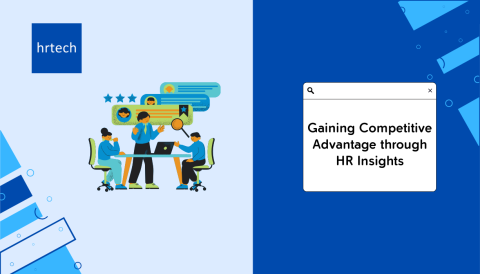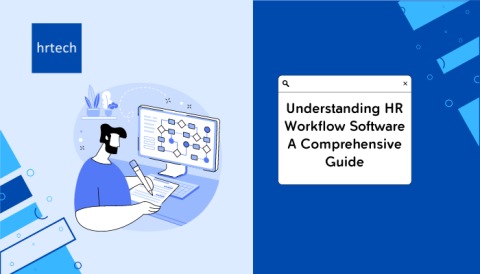The evolution of HR technology has been remarkable, transitioning from on-premise software to cloud-based platforms like Human Resource Management SaaS (HRM SaaS). Staying updated with HR trends is crucial for organizations to remain competitive and efficient.
In 2024, several key trends are set to impact HRM SaaS, including workplace digitization, hybrid setups, digital learning and development, hyper-personalization, and data-driven diversity, equity, and inclusion (DEI).
These trends are expected to revolutionize the way organizations manage their human resource management saas, offering cost-effectiveness, scalability, and enhanced efficiency. Embracing cloud-based HR solutions empowers HR teams to focus on strategic tasks, fostering employee engagement and driving HR excellence. This blog will provide a comprehensive overview of these trends and their implications for HRM SaaS in 2024, helping organizations prepare for the changing tides of the HR landscape.
Emergence Of AI And Machine Learning:
The emergence of AI and machine learning in Human Resource Management SaaS (HRM SaaS) is reshaping the HR technology landscape. AI and machine learning are revolutionizing HR processes by enabling predictive analytics, chatbots for self-service, and personalized user experiences.
In 2024, AI is expected to be applied in HRM SaaS for enhanced people analytics, seamless HR self-service, and improved data quality.
Companies like Oracle and SuccessFactors have successfully integrated AI into their HRM SaaS, offering AI-powered digital assistants and analytics capabilities. AI and machine learning are essential for SaaS, providing better services, improving customer experience, and increasing revenue.
Most machine learning applications in SaaS automate high-volume manual procedures, cutting expenses and enhancing efficiency. The impact of AI and machine learning in SaaS is already evident, and their continued evolution is expected to bring more innovative use cases in the future.
Integrating machine learning and AI enriches SaaS software at every level, offering a competitive advantage and automation across various business processes.
Transforming HR through Agile Workforce Solutions
Growth In Employee Wellness Programs:
The increasing focus on employee wellbeing is directly linked to enhanced productivity and overall organizational success. As organizations recognize the impact of employee wellness on performance, the integration of wellness programs and initiatives in Human Resource Management SaaS (HRM SaaS) is becoming more prevalent.
In 2024, the development of wellness programs in HRM SaaS is predicted to prioritize personalized employee experiences, mental health support, and holistic wellbeing management. Several HRM SaaS platforms, such as Oracle and SuccessFactors, have incorporated features like wellness program management, mental health resources, and fitness tracking to support employee wellbeing.
The integration of wellness programs in HRM SaaS not only fosters a healthier and more engaged workforce but also aligns with the organization’s goals of driving productivity and talent retention. As organizations strive to create a positive work environment, the evolution of wellness programs within HRM SaaS is poised to play a pivotal role in shaping the future of employee management and organizational success.
Enhanced Use Of Analytics:

The importance of data analytics in HRM is evident, with SaaS HR platforms serving as hotbeds for AI and analytics innovations in HR technology. These platforms integrate analytics to provide better, quicker ways to access HR information, making the user experience more effective and engaging.
In 2024, the future of analytics in HRM SaaS is expected to focus on tapping emerging technology to guide users through processes, leading to improved data quality and enhanced machine learning and analytics capabilities.
Real-life case studies have demonstrated the impact of analytics on HRM, with HR management software enabling SMBs to track requisitions, optimize talent pipelines, analyze skills gaps, and engage employees. The integration of analytics into HRM SaaS is poised to significantly improve data quality, user experience, and overall HR management, driving better decision-making and strategic planning within organizations.
Increase In Remote And Hybrid Works:
The rise of remote and hybrid work has significantly impacted how organizations operate, emphasizing the need for Human Resource Management SaaS (HRM SaaS) to facilitate these new work models. Cloud-based HR tools are increasingly essential for supporting remote and hybrid teams, offering features such as digitized workflows, seamless communication, and collaboration support.
As the prevalence of remote work continues to grow, HRM SaaS is predicted to undergo changes to better accommodate this shift. This may include enhanced remote access, advanced communication and collaboration tools, and features specifically designed to maintain engagement and support the well-being of remote workers.
Several HRM SaaS tools, including custom HRMS software, are already being tailored to upgrade remote working strategies, allowing for managing employee records from various devices. As the future of work leans towards a more efficient hybrid model, the role of HRM SaaS in supporting remote and hybrid work is set to become even more integral, ensuring that organizations can effectively manage their workforce regardless of location.
Greater Emphasis On Diversity And Inclusion:
The rise of remote and hybrid work has significantly impacted how organizations operate, emphasizing the need for Human Resource Management SaaS (HRM SaaS) to facilitate these new work models. Cloud-based HR tools are increasingly essential for supporting remote and hybrid teams, offering features such as digitized workflows, seamless communication, and collaboration support.
HRM SaaS is predicted to undergo changes to better accommodate this shift, including enhanced remote access, advanced communication and collaboration tools, and features specifically designed to maintain engagement and support the wellbeing of remote workers.
Several HRM SaaS tools, including custom HRMS software, are already being tailored to upgrade remote working strategies, allowing for the management of employee records from various devices. As the future of work leans towards a more efficient hybrid model, the role of HRM SaaS in supporting remote and hybrid work is set to become even more integral, ensuring that organizations can effectively manage their workforce regardless of their location.
Conclusion:
In conclusion, the trends affecting Human Resource Management SaaS (HRM SaaS) in 2024 are shaping the future of HRM by fostering innovation, efficiency, and employee engagement. These trends, including AI and machine learning, employee wellness programs, remote and hybrid work, enhanced use of analytics, and diversity and inclusion, are critical for businesses to adapt to and embrace. By staying updated on these trends and adopting new HRM SaaS advancements, organizations can drive HR excellence and unlock the full potential of their workforce.





